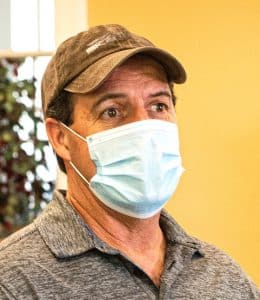Wagner keeps up the fight

Monroe County Health Department Administrator John Wagner went on a fishing trip to Table Rock Lake in Missouri with his son for the weekend early this year.
His phone rang constantly with information and questions about the coronavirus that would soon upend American life.
That was the last time Wagner had so much leisure time.
“I’m not doing a whole lot of other stuff,” Wagner said. “I’m a fairly big tournament fisherman, and I have only been fishing once this year, and that was at the beginning of March.”
Although he has been with the county’s health department since 1996, Wagner was unknown to many before rising to prominence this year as he helps lead Monroe County’s COVID-19 response.
Wagner earned a bachelor’s in biology with an emphasis in agriculture and wildlife conservation from Missouri State University, but he soon found his career went elsewhere.
“I’ve been in public health almost since I graduated college,” Wagner said. “It’s just kind of that path that it took me on.”
Wagner, who also specializes in sinkholes, served as a health inspector in Greene County in Missouri and in St. Louis before coming to work as the environmental inspector for the Bi-County Health Department that served Monroe and Randolph counties.
He then earned a promotion to director of environmental health and, when each county got its own department, administrator.
Although his title is administrator, Wagner said he does more than just that.
“I’m actually a working administrator,” he said. “At some of the bigger health departments, all the administrators do is administrate. I actually still do some environmental health and a lot of other stuff. I have no bookkeeper or anything like that, so it’s all done by me.”
Prior to the pandemic, Wagner said he spent most of his time at work attending state and local meetings, dealing with budgetary issues, grant writing and providing daily management and supervision of the county’s environmental health including septic, wells and food establishments.
“It was pretty much an eight-hour day, if I can remember that far back,” Wagner joked.
Since mid-March, however, Wagner’s new normal has been “nonstop” and “never getting off (his) phone until about 10 o’clock at night.”
He and his staff are frequently working 11-14 hours on weekdays, and he often works 4-5 hours on weekends.
“It’s a drain, and not only on me but my whole staff,” Wagner said. “We’re trying to stay up with our normal stuff and trying to support the public on everything else with the rest of the stuff that’s going on. It’s getting tough to keep morale up.”
These days, Wagner said he spends about 10-20 percent of his time doing the work he must do to maintain the health department’s regular programs and functions – though the state has made that easier by easing some reporting requirements.
“We still have our regular programs that are ongoing, so I still have to maintain our grant writing and all that for those,” he noted.
The rest of the time Wagner is working on coronavirus matters.
In addition to its normal work and coronavirus duties, the health department is also now preparing for mass vaccinations for the flu and COVID-19.
Wagner said he never expected to be working during a pandemic like this.
“It’s not something I signed up to do. It’s kind of like being in the Army: you don’t sign up to go to war, but if it happens it’s part of your job,” Wagner explained.
He also said that while drastic public health concerns, like Swine Flu or Ebola, happen every 10 years or so, the coronavirus “is really bad.”
The pandemic has also forced Wagner to rely on his staff more.
“I rely heavily on my nurses here to guide me through some of the technical, medical questions associated with COVID because I do not have a medical degree,” he said.
The one bright spot in the whole situation, Wagner said, is there appears to be a light at the end of the tunnel as vaccine research is progressing.
“There is an end to this,” he said. “We are going to get out of this, at least right now. The vaccines are very promising.”
Wagner said a vaccine will not solve all the problems related to the virus since it will not wipe it out the same way the Polio vaccine did.
That means his department will be contact tracing sick people and quarantining them when outbreaks occur for the foreseeable future.
But he said a vaccine will help immensely and emphasized that it will be safe.
“People need to realize that the way they’re developing this vaccine is not a brand new technology,” he stressed. “They’ve been working with these technologies for forever. Once it does come out, I would have no doubts that it’s going to be safe and people should get it. The biggest issue would be you get it and it doesn’t do as well as they said it would. But as far as safety, it’s going to be safe.”






